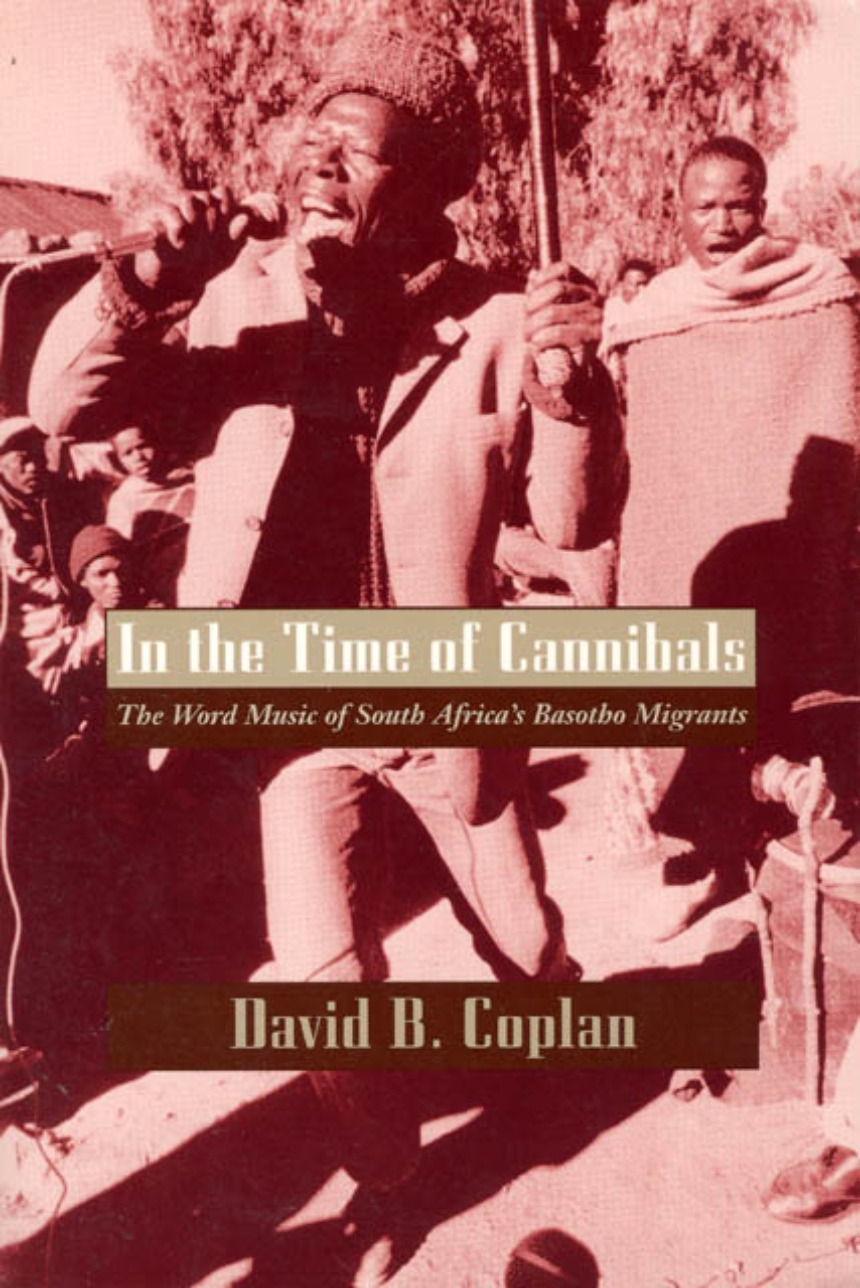In the Time of Cannibals
The Word Music of South Africa’s Basotho Migrants
9780226115740
9780226115733
In the Time of Cannibals
The Word Music of South Africa’s Basotho Migrants
The workers who migrate from Lesotho to the mines and cities of neighboring South Africa have developed a rich genre of sung oral poetry—word music—that focuses on the experiences of migrant life. This music provides a culturally reflexive and consciously artistic account of what it is to be a migrant or part of a migrant’s life. It reveals the relationship between these Basotho workers and the local and South African powers that be, the "cannibals" who live off of the workers’ labor. David Coplan presents a moving collection of material that for the first time reveals the expressive genius of these tenacious but disenfranchised people.
Coplan discusses every aspect of the Basotho musical literature, taking into account historical conditions, political dynamics, and social forces as well as the styles, artistry, and occasions of performance. He engages the postmodern challenge to decolonize our representation of the ethnographic subject and demonstrates how performance formulates local knowledge and communicates its shared understandings.
Complete with transcriptions of full male and female performances, this book develops a theoretical and methodological framework crucial to anyone seeking to understand the relationship between orality and literacy in the context of performance. This work is an important contribution to South African studies, to ethnomusicology and anthropology, and to performance studies in general.
Coplan discusses every aspect of the Basotho musical literature, taking into account historical conditions, political dynamics, and social forces as well as the styles, artistry, and occasions of performance. He engages the postmodern challenge to decolonize our representation of the ethnographic subject and demonstrates how performance formulates local knowledge and communicates its shared understandings.
Complete with transcriptions of full male and female performances, this book develops a theoretical and methodological framework crucial to anyone seeking to understand the relationship between orality and literacy in the context of performance. This work is an important contribution to South African studies, to ethnomusicology and anthropology, and to performance studies in general.
322 pages | 8 halftones | 6 x 9 | © 1994
Chicago Studies in Ethnomusicology
Anthropology: Cultural and Social Anthropology
Music: Ethnomusicology
Table of Contents
Acknowledgments
Preface
Orthographic Note
Ch. 1: "Hyenas Do Not Sleep Together": The Interpretation of Basotho Migrants’ Auriture
Ch. 2: "The Mouth of a Commoner Is Not Listened To": Power, Performance, and History
Ch. 3: "Greetings, Child of God!": Generations of Travelers and Their Songs
Ch. 4: "An Initiation Secret Is Not Told at Home": The Making of a Country Traveler
Ch. 5: "These Mine Compounds, I Have Long Worked Them": Auriture and Migrants’ Labors
Ch. 6: "I’d Rather Die in the Whiteman’s Land": The Traveling Women of Eloquence
Ch. 7: "My Heart Fights with My Understanding": Bar Women’s Auriture and Basotho Popular Culture
Ch. 8: "Eloquence Is Not Stuck on Like a Feather": Sesotho Aural Composition and Aesthetics
Ch. 9: "Laughter Is Greater than Death": Migrants’ Songs and the Meaning of Sesotho
Appendix One
Appendix Two
References
Index
Notes
Preface
Orthographic Note
Ch. 1: "Hyenas Do Not Sleep Together": The Interpretation of Basotho Migrants’ Auriture
Ch. 2: "The Mouth of a Commoner Is Not Listened To": Power, Performance, and History
Ch. 3: "Greetings, Child of God!": Generations of Travelers and Their Songs
Ch. 4: "An Initiation Secret Is Not Told at Home": The Making of a Country Traveler
Ch. 5: "These Mine Compounds, I Have Long Worked Them": Auriture and Migrants’ Labors
Ch. 6: "I’d Rather Die in the Whiteman’s Land": The Traveling Women of Eloquence
Ch. 7: "My Heart Fights with My Understanding": Bar Women’s Auriture and Basotho Popular Culture
Ch. 8: "Eloquence Is Not Stuck on Like a Feather": Sesotho Aural Composition and Aesthetics
Ch. 9: "Laughter Is Greater than Death": Migrants’ Songs and the Meaning of Sesotho
Appendix One
Appendix Two
References
Index
Notes
